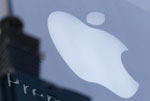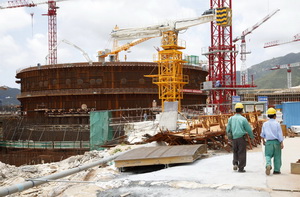PMI rebounds to 50.9% in August, shows signs of stabilizing
Updated: 2011-09-01 10:31
(Xinhua)
|
|||||||||||
China's Purchasing Managers' Index (PMI) rebounded to 50.9 percent in August from a 29-month low of 50.7 percent in July, the China Federation of Logistics and Purchasing (CFLP) said Thursday.
The August figures ended four consecutive months of decline and exceeded a preliminary forecast of 49.8 percent for the month by global financial services company HSBC.
The PMI is a gauge of manufacturing growth. A reading below 50 indicates contraction from the previous month, while a reading above 50 indicates expansion.
Cai Jin, deputy chairman of the CFLP, said the index shows that China's economic growth has remained stable. The manufacturing index is based on a survey of purchasing managers from more than 820 companies in 20 industries.
The sub-index for new orders remained unchanged from July at 51.1 percent, while the sub-index for new export orders fell to 48.3 percent from 50.4 percent in July, the CFLP said in a statement.
The output sub-index rose by 0.2 percentage points from July to 52.3 percent in August.
The slight improvement indicates that the country's economic policies are having a stabilizing effect, said Zhang Liqun, a researcher with the Development Research Center of the State Council, or China's cabinet.
However, he also warned of uncertainties in demand. The relatively large dip in the sub-index for new export orders signaled that export growth might shrink significantly in the future, he said.
There are also possibilities that investment growth in infrastructure and the property sector will drop, he said.
The sub-index for input prices rose to 57.2 percent from 56.3 in July, according to the statement. China's companies are facing rising costs as purchasing prices continue to grow, Zhang added.
China's PMI fell for four consecutive months amid government tightening measures that were put in place to check price hikes. Inflation escalated to a 37-month high of 6.5 percent in July, well above the government's target ceiling of 4 percent.
Analysts forecasted that the inflation index would drop in August but continue to stay above 6 percent. Inflation figures for August are scheduled to be released next week.
The People's Bank of China, the country's central bank, has raised interest rates three times and reserve requirement ratios six times so far this year to drain excessive liquidity out of the market.
The Shanghai Securities News reported on Monday that the central bank has further reined in bank lending by asking commercial banks to include margin deposits in their reserve requirements.
In the latest issue of Qiushi, the flagship magazine of the Communist Party of China (CPC) Central Committee, an article by Premier Wen Jiabao stated that stabilizing consumer prices remains the top priority of the government's macro-regulation agenda.
He stated that price hikes must be checked without generating large fluctuations in the country's economic growth rate.
China's gross domestic product (GDP) rose by 9.5 percent year-on-year in the second quarter of 2011, tapering off slightly from the 9.7-percent growth posted in the first quarter of this year and 9.8 percent in the fourth quarter of last year.
The slowdown in the economic growth is reasonable and within government expectations, Wen wrote.













